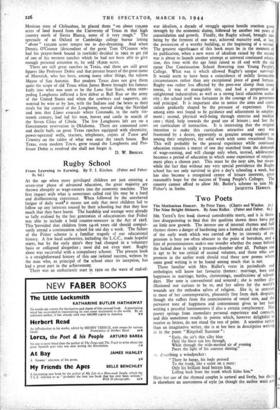Rugby School
AT the age when more privileged children are just entering a seven-year phase of advanced education, the great majority are thrown abruptly as wage-earners into the economic machine. This first impact with what is sometimes called real life may be a hard and disillusioning experience. When followed by the unrelieved fatigue of daily work` it means not only that most children fail to follow up any interests roused by their schooling but that they lose much that they have learnt. The hardship and wastage were already so fully realised by the last generation of educationists that Fisher was able to include a bold counter-measure in the Act of 1918. This provided that children from 14-16 years old should compul- sorily attend a continuation school for one day a week. The failure of the Fisher scheme is a familiar tragedy of our educational history. A few local authorities, including the L.C.C., made hopeful starts, but by the early 1920's they had changed to a voluntary basis or collapsed altogether ; most did not even start. Rugby alone was successful with a compulsory scheme. The present book is a straightforward history of this one isolated success, written by the man who, as principal of the school since its inception, has had a great part in the achievement.
There was an enthusiastic start in 1920 on the wave of end-of- war idealism, a decade of struggle against hostile reaction given strength by the economic slump, followed by another ten years of consolidation and growth. Finally, the Rugby school, brought into being by the ferment of one war, achieved maturity and, at last, the possession of a worthy building, at the beginning of a second. The greatest significance of this book must be in the moment of its publication, when a new wave of idealism raised by the second war is about to launch another attempt at univeral continued educa- tion, this time with the age limit raised to 18 and with the old name Day Continuation School flowering into Young People's College. What was it which allowed Rugby's unique survival? It would seem to have been a coincidence of mildly favourable circumstances rather than any exceptional piece of good fortune. Rugby was rather less affected by the post-war slump than many towns, it was of manageable size, and had a proportion of enlightened industrialists as well as a strong local education autho- rity ; the school itself was fortunate in the courage of its governors and principal. It is important also to notice the aims and curri- culum gradually shaped by the pressure of experience. First among aims was found to be guidance and adjustment in employ- ment; second, physical well-being through exercise and medical care ; third, help towards the good use of leisure ; and last the
set curriculum of instruction. It is interesting that the original intention to make this curriculum attractive and easy was frustrated by a desire, apparently as genuine among students as among their employers, for solid work with some vocational bias. This will probably be the general experience while continued education remains a matter of one day snatched from the demands of wage-earning, and will change only when, instead, adolescence becomes a period of education in which some experience of employ- ment plays a chosen part. This must be the next aim, but mean- while the fact that without any very special providence the Rugby school has not only survived to give a day's schooling a week, but has also become a recognised centre of leisure interests, gives reasonable hope for the success of Young People's Colleges. The country cannot afford to allow Mr. Butler's scheme to join Mr


























 Previous page
Previous page